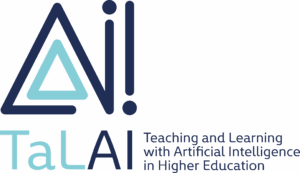
TaLAI (Teaching and Learning with Artificial Intelligence in Higher Education)
TaLAI (Teaching and Learning with Artificial Intelligence in Higher Education)
| In the current era of digital transformation, higher education has a crucial role to play in equipping professionals with the necessary digital skills to manage AI responsibly. By extending existing partner networks and facilitating collaborations, the TaLAI (Teaching and Learning with Artificial Intelligence in Higher Education) Erasmus+ project has a dual mission: Not only to benefit national communities, but also to contribute to the advancement of innovation in teaching and learning at the European level. The initiative provides academic teachers with the opportunity to enhance their AI skills and competences, ultimately impacting on various aspects of societal life through the implementation of novel teaching methods. |
Project information
| Project leader(s): Julia Dawitz (TLC Science), Emma Wiersma (TLC Science), Katrin Schulz (ILLC), Jelle Zuidema (ILLC), Evangelos Kanoulas (IvI)
Educational innovation: introducing innovative pedagogical approaches that integrate AI in higher education in an ethical way Duration: november 2023 till november 2026 |
 |
Aims & objectives
The main objective is to lead the way in introducing innovative pedagogical approaches that integrate AI in higher education in an ethical way. It aims to empower both educators and students in developing AI literacy and competence.
To achieve this objective, the consortium will develop:
- The digital TaLAI Platform, which includes:
- Guiding rules and principles of an ethical AI application in higher education.
- Digital storytelling by academics about the ethical use of AI in teaching and learning.
- Recommendations for written assignments and their assessment in higher education.
- Mapping the instructional design and pedagogical approaches with AI in higher education.
- A discussion forum and practical suggestions, addressing the ethical issues associated with AI in higher education.
- The TaLAI Online Course (MOOC) to further develop digital literacy skills and capacities of academic teachers to ethically apply AI in their teaching practice.
- The TaLAI policy recommendations for assessment in times of AI in higher education.
Publications
Tillmanns, T., Salomão Filho, A., Rudra, S., Weber, P., Dawitz, J., Wiersma, E., Dudenaite, D., & Reynolds, S. (2025). Mapping Tomorrow’s Teaching and Learning Spaces: A Systematic Review on GenAI in Higher Education. Trends in Higher Education, 4(1), 2. https://doi.org/10.3390/higheredu4010002
Rudra, S., Weber, P., Tillmanns, T., Filho, A. S., Wiersma, E., Dawitz, J., Dudenaite, D. and Reynolds, S. (2025). Use and Perception of Generative AI in Higher Education: Insights from the ERASMUS+ Project ‘Teaching and Learning with Artificial Intelligence’ (TaLAI). In Proceedings of the 17th International Conference on Computer Supported Education – Volume 2: CSEDU; ISBN 978-989-758-746-7; ISSN 2184-5026, SciTePress, pages 319-330. DOI: 10.5220/0013360200003932
Partner institutions
- Friedrich-Alexander-Universität Erlangen-Nürnberg (FAU), Institut für Lern-Innovation (ILI) (coordinator)
- Fachhochschule Südwestfalen
- Media & Learning Association
Funding
Funding: Erasmus+
This Project has received funding from the European Union under grant agreement: 2023-1-DE01-KA220-HED-000153155.
Funded by the European Union. Views and opinions expressed are however those of the author(s) only and do not necessarily reflect those of the European Union or Deutscher Akademischer Austauschdienst e.V. – Nationale Agentur für Erasmus + Hochschulzusammenarbeit. Neither the European Union nor the granting authority can be held responsible for them.







